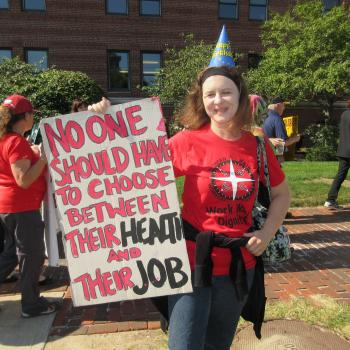One of the most common fallacies on the right is the mis-use of the subsidiarity principle to support an ideological opposition to the role of government. Of course, it is true that oppressive state power can trample upon human dignity; the experience of the former Soviet Union comes to mind, and Pope John Paul warned that a welfare state (necessary though it is) can sometimes become overly-bureaucratic and far removed from the dignity of each person.
But the popes who developed Catholic social teaching were worried about something quite different – about overly-powerful business interests and corporations who deny workers fair wages and benefits, and who use their financial leverage to reward themselves and tilt public policy in an unjust direction. Pope Pius XI, who more than anyone laid out the intellectual underpinnings of subsidiarity, railed against “immense power and despotic economic dictatorship ..consolidated in the hands of a few” who use their muscle to “gain supremacy over the State”. A correct social order, in the view of Pope Pius, would be one where the “riches that economic-social developments constantly increase ought to be so distributed among individual persons and classes that the common advantage of all” and where “one class is forbidden to exclude the other from sharing in the benefits”.
This is as true today as it was during the 1930s when Pius wrote these prescient words. As I’ve said before, by the dawn of the twenty-first century, the level of inequality was back up to the peak of the 1930s. It is really no accident an economic calamity was the result of such an imbalance each time. This rise in inequality was characterized by a decline in union power (often a breaking of union power), a change in social norms regarding wealth (the Reagan and Wall Street era), and the rising power of monied interests in the political sphere (possibly the most important reason of all). Pius XI had especially sharp words to say about the power of big finance, as the people who “regulate the flow, so to speak, of the life-blood whereby the entire economic system lives, and have so firmly in their grasp the soul, as it were, of economic life that no one can breathe against their will”.
And today, economists like Simon Johnson make similar arguments, claiming that the finance industry has effectively captured government. This sector accounted for 16 percent of corporate profits before 1985 – this has risen to 41 percent. And what did they want? Basically, the removal of any impediments to further wealth accumulation, without heed to risk. And they got it – repeal of regulations separating commercial and investment banking, bans on the regulation of credit-default swaps, major increases in investment bank leverage, a hands-off regulatory environment, an agreement to let banks assess their own riskiness, and free movement of capital across borders. And when the house of cards collapsed, and the government had to clean up the mess, they still ended up using a “velvet-glove approach” with the bankers. And today, the big banks are bigger, more concentrated, and more powerful than ever.
The new financial sector legislation is a major step forward, although it shies away from breaking up the oligarchs or taxing them seriously. The jury is still out on whether it will work. But while Wall Street has been given a bloody nose, it has not been knocked out. In fact, it is enraged and out for revenge. And the revenge comes in the form of political campaign contributions – Wall Street is pulling money away from Democrats at lightening speed. Contributions are down over 60 percent, and this money is being funnelled to Republicans, who are more than happy to do Wall Street’s bidding – as we saw clearly with the financial regulation bill.
Look too at the Chamber of Commerce. In a fascinating expose, James Verini shows how powerful this group has become, and how it singularly looks out for the interests of its largest, richest, and most powerful members. In 2009, it spent over $120 million on lobbying, five times more than the next group. It went all in to destroy the healthcare legislation, and lost. Just like Wall Street, it is now seeking the restoration of its power alongside a dose of revenge. It has pumped $50 million into Congressional races, with $4 out of every $5 going to the GOP. For while the Chamber theoretically represents small businesses (96 percent of its members have fewer than 100 employees), it is beholden to the largest corporations who control its purse strings (a third of its revenues come from just 19 companies). The Chamber is on record as supporting this strategy: “You can no longer run a huge national organization on the backs of small companies” claims president Thomas Donohue.
And what do they want? No healthcare reform. No financial sector regulation. No environmental legislation (they even question the existence of climate change). Breaking the power of labor. Continued deregulation.
Big finance and big business are as strong as ever. The warnings given by Pope Pius XI in the 1930s ring as strongly today as they did during that period. And yet, in the American political system, money always wields power, opens doors, and gets results. Millions of unemployed workers can be callously denied benefits, but the oil companies still get their subsidies. The titans of industry are not crossed. This capture extends all the way to the Supreme Court, where John Roberts is steering the court in a sharply pro-business direction, even if it means thumbing the nose at the legislature. Just remember Citizens United, which gives unprecedented power to monied interests.
On the right, subsidiarity is given lip service. In reality, the power of big business and big finance are leading to outcomes that violate the common good and the norms of justice. It is time to restore authentic Catholic social teaching.












